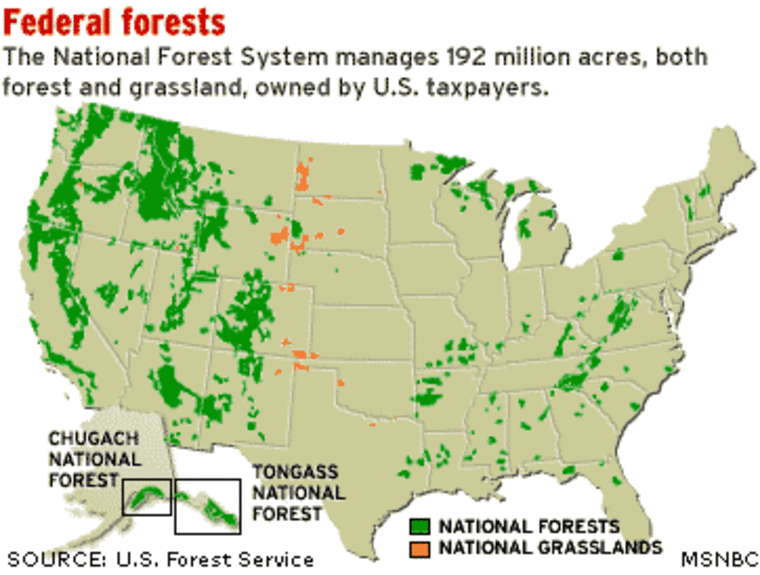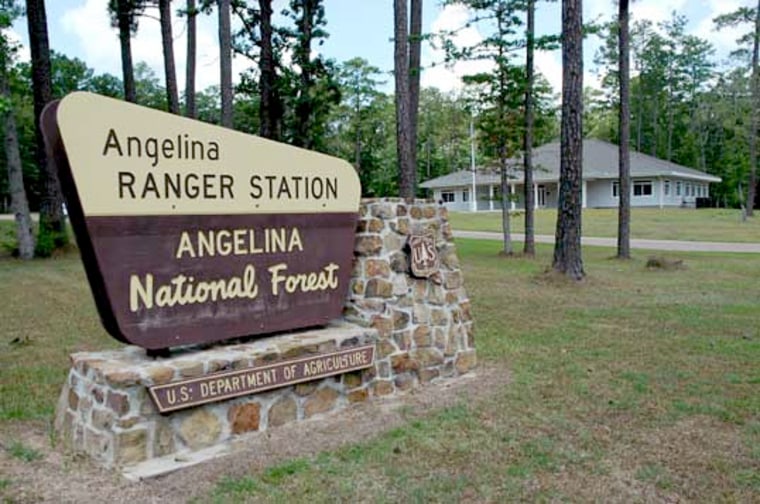Senators from both parties are challenging a Bush administration plan to sell up to 300,000 acres of national forest land to help pay for rural schools in 41 states.
Lawmakers said the short-term gains would be offset by the permanent loss of public lands. They also said profits from the proposed sales would fall far short of what's needed to help rural governments pay for schools and other basic services.
"I just don't think we can play Russian roulette with these local communities," said Sen. Ron Wyden, D-Ore., who vowed to "do everything I can" to stop the plan.
Sen. Larry Craig, R-Idaho, had a more visceral reaction: "No, heck no," he told Bush administration officials at a Senate hearing Tuesday.
Wyden and Craig were co-sponsors of a 2000 law that has pumped more than $2 billion into rural counties hurt by logging cutbacks on federal land. The so-called "county payments" law has helped offset sharp declines in timber sales in Oregon and other Western states in the wake of federal forest policy that restricts logging to protect endangered species such as the spotted owl.
The law is set to expire Sept. 30. The land-sale plan would reauthorize the law for five years, but calls for a phased reduction in funding to zero by 2011.
Official: ‘One-time’ event
Agriculture Undersecretary Mark Rey, who directs U.S. forest policy, called the proposed cutbacks painful but necessary. The law was never intended to be permanent, he said, but was a way to help rural counties make the transition from dependence on timber receipts to a more broad-based economy.
The lands proposed for sale are all isolated, difficult or expensive to manage, and no longer meet Forest Service needs, Rey said.
"We think this is justified as a one-time transition to help rural schools" for five more years before eliminating the program entirely, Rey told the Senate Energy and Natural Resources Committee.
Rural counties that have diversified their economies and local budgets in recent years should be fine, Rey said, but those that have not "are facing rather dramatic and immediate reductions in their school budgets."
Rey added that local governments and land trusts would have the right of first refusal in the sales, provided that they pay “fair market value.”
The U.S. Forest Service would sell parcels of lands that do not connect to greater federal holdings. The list will continually change but, as it stands now, is topped by almost 80,000 acres in California, 25,464 acres in Idaho and 21,572 acres in Colorado.
While the list of eligible lands for sale encompasses more than 300,000 acres, Rey said the service may not sell that much. Once the goal of $800 million has been reached, he said, the sales would be suspended. He estimated that only 175,000 acres would have to be sold.

More senators weigh in
His comments were met with bipartisan derision.
"To propose selling off public lands we will lose forever, in exchange for a program we can pay for by other more prudent means, is simply irresponsible," said Sen. Craig Thomas, R-Wyo.
"The Bush administration wants to eliminate a proven, balanced initiative in favor of a public lands fire sale," added Sen. Maria Cantwell, D-Wash.
Sen. Jim Talent, R-Mo., said he was not opposed to the land sale in principle, but was concerned about how much revenue would go to Missouri schools. The Bush plan would sell 21,566 acres in Missouri's Mark Twain National Forest — the third-largest land sale in the country — but would result in a likely cut in funding for Missouri schools.
"Our schools need the money," Talent said.
Opponents say there are other ways to raise money.
“This administration is under-funding schools and to make up for that they want to sell off lands in a one-time deal,” said Rob Vandermark, forests director of National Environmental Trust.
Background on the Forest Service land sale proposal is online at www.fs.fed.us/land/staff/rural_schools.shtml
